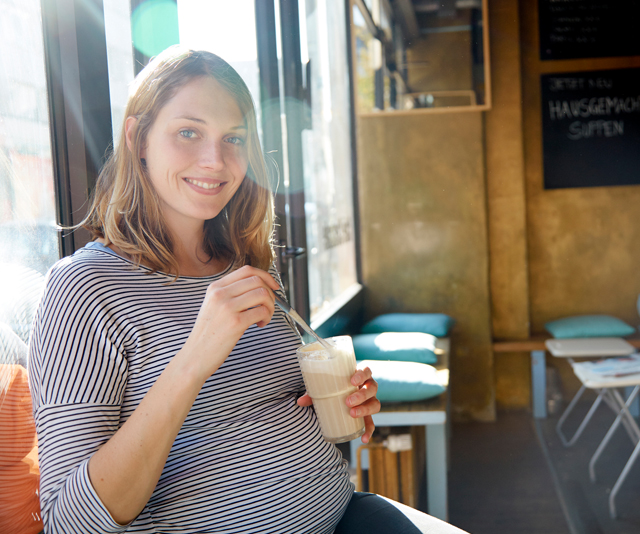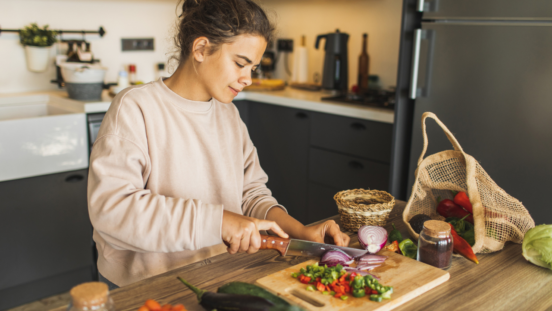Is it safe to drink coffee while pregnant?
New research has experts divided.
Health professionals have always recommend you limit your caffeine intake while pregnant as high levels of caffeine have been linked to miscarriage and premature birth.
Currently the NSW Food Authority advises pregnant women to have no more than 200mg of caffeine daily – an amount found in three cups of instant coffee, one cup of espresso style coffee or four cups of medium-strong tea.
However this week, scientist Professor Jack James has divided experts with his advice which stresses that no amount of coffee should be considered safe while expecting.
To better understand the potential dangers of the consumption of caffeine during pregnancy, the scientist from Reykjavik University analysed 48 studies which had been carried out in the past 20 years.
The results may have been mixed, yet the Professor concluded there is “substantial cumulative evidence” that drinking coffee while pregnant is linked to everything from a miscarriage and stillbirth to childhood obesity and even leukaemia. A decision that not everyone agrees with.
Experts have called the research “overly alarmist” and “of questionable significance.”
Fertility and Prenatal Dietitian, Melanie McGrice tells Bounty Parents: “I don’t believe that caffeine needs to be banned or have warnings, but the fact is that most people have no idea how much 200mg of caffeine is, making it easy to overconsume.”

Fertility and Prenatal Dietitian, Melanie McGrice says understanding how much 200mg of caffeine is is essential.
“Although the research isn’t new, the author believes that pregnant mummas should be advised to avoid caffeine during pregnancy. I tend to agree,” says Melanie.
“I don’t believe that the author has provided adequate evidence to extend this advice to couples who are trying to conceive, so I will continue to recommend that they limit their caffeine intake to 200mg until more tailored advice is available.”
Professor James stressed that his research and conclusions may have been impacted by other factors, like smoking and the ability of a woman to recall how much caffeine she consumed during pregnancy.
His advice remains: “Specifically, the cumulative scientific evidence supports pregnant women and women contemplating pregnancy being advised to avoid caffeine.”

Experts say it is best to limit your caffeine intake while pregnant. Image: Getty images.
“For those still wanting a coffee, decaffeinated coffee is a safe choice,” says Melanie Mcgrice.
You should be aware that a cup of decaf usually still contains two to five milligrams of caffeine and sometimes more.
“Many women naturally develop an aversion to coffee during pregnancy,” says Melanie. “I find that most of the women who drink it do so for the energy boost it provides. Instead of coffee for energy, I recommend checking iron levels, ensuring adequate water consumption, getting plenty of sleep and ensuring small, regular meals including low GI carbohydrates.”
Be aware that coffee served at cafes can contain more caffeine than you’d expect, and remember that caffeine is also present in tea (including green tea), chocolate and some energy drinks.
Continues after video …
Pregnancy is a fantastic opportunity to overhaul your diet and improve your eating habits so that you and your baby are getting all the vitamins and minerals you both need. Aside from cutting down on caffeine, follow these tips for a healthy pregnancy….
- Avoid using your changing body shape as an excuse to overindulge in sugary and fatty snacks, instead health authorities recommend eating two portions of fruit and five servings of vegetables every day.
- Carbohydrates – the starchy kind found in bread, pasta, rice and cereals – are vital for pregnancy. You need a balanced diet for healthy weight gain, and, as they are your body’s first source of ready energy, you’ll find yourself craving them as your baby grows.
- The calcium and other essential nutrients provided by dairy products – milk, yoghurt and cheese – are essential for your baby’s development.
- During pregnancy, planning a pregnancy or while breastfeeding, the National Health and Medical Research Council advises that the safest option for women is to avoid alcohol. Instead aim to drink plenty of water to prevent dehydration and constipation.
- If you’re a smoker, try to quit before you fall pregnant. Women who smoke throughout pregnancy are at an increased risk of miscarriage, while the danger of still birth or their baby dying from sudden infant death syndrome (SIDS) is also significantly greater. Smoking during pregnancy can cause a low birth-weight baby, which can be life-threatening.




